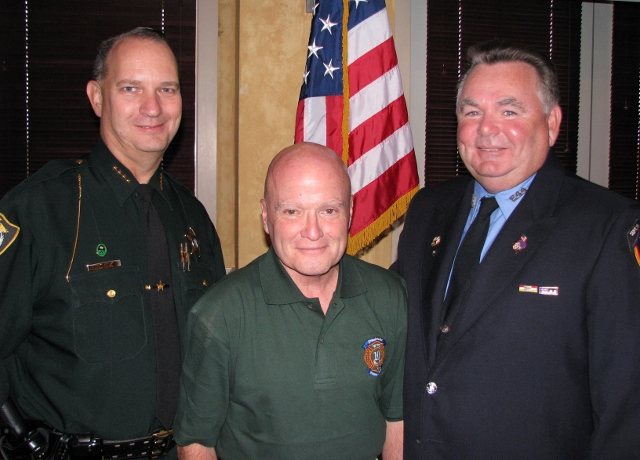
VERO BEACH — Surreal is a word frequently used to describe the 9/11 terrorist attacks; uttered equally by those who experienced the horrors of the day first-hand as well as those who watched the tragedy unfold from a distance. At a September 11 Tenth Anniversary Remembrance Luncheon hosted by the Grand Harbor Book Club, guest speakers Jack Kemp and Ed Kennedy used the term as they recounted their experiences as survivors of that fateful day.
At the time of the attacks Jack Kemp, a part-time John’s Island resident, was employed as Managing Director at Morgan Stanley, working on the 70th floor of the World Trade Center’s south tower. Then a New York City Firefighter, Ed Kennedy was one of the first responders; rushing toward the disaster as others escaped.
“Every day this month is 9/11,” said event organizer Peggy Pitta, a retired New York City Police Officer. Service to country runs in the family; husband John retired as the resident agent in charge for ATF, son John is an F-18 Hornet pilot, Timothy an Army nurse, and Billy a NYC firefighter. Daughter Mary Beth, then a teacher in lower Manhattan, witnessed the tragedy from her classroom.
“In war, true heroes lie in graves on the battlefield,” said Kemp, after an introduction by Sheriff Deryl Loar. “With 9/11, they’re buried at Ground Zero, the Pentagon and on a field near Shanksville, Pennsylvania.”
He went on to pronounce the day as, “A nightmare that had become a reality.”
Kemp had survived the World Trade Center bombing in 1993, joining 20,000 others in a smoke-filled trek down long flights of stairs. After the bombing, Rick Rescorla, a retired Army Colonel and Morgan Stanley’s head of security, predicted an air attack and instituted regular evacuation drills for the company.
Kemp credits that preparedness for saving the lives of all but six of the 2,700 Morgan Stanley employees in WTC 2. In a tragic twist of fate, Rescorla perished after heading back inside to rescue others still trapped. His life story was featured in the History Channel presentation, “The Man Who Predicted 9/11”.
“We saw Tower One on fire; we saw people jumping, flames everywhere, and paper fluttering down,” said Kemp. Despite directives over the PA system from the Port Authority to remain in their offices, his employees began evacuating immediately.
After Kemp made a last turn around the office to check for stragglers, the impact from the second plane crashing into Tower Two threw him across his office. A security guard, working his first day on the job, directed Kemp and a final group of employees to the fire stairs and they began their treacherous descent, picking up wounded survivors along the way.
“As we got down towards the bottom, firemen were trudging up the stairs carrying all that heavy equipment,” remembers Kemp. “Having walked down, I could never imagine walking up the Trade Center stairs.”
Kemp and the majority of the Morgan Stanley employees would eventually made it to safety, but not before seeing their world collapse as the towers imploded. With emotion choking his voice, Kemp spoke movingly about giving a tribute at the funeral of Tommy Swift, a 31-year-old office favorite who never made it out of the building.
Ed (Eddie) Kennedy, retired after 21 years in the NYC Fire Department and spoke about the disaster from a different perspective, paying tribute to the 243 firefighters who died that day.
“There is no rhyme or reason why some survived and some didn’t,” said Kennedy. “2,700 people lost their lives, and survivors often think, “Why me?””
As both men noted, the day began as gorgeous fall morning; Kennedy had tickets to Yankee Stadium that night. But the crystal clear beauty quickly turned into a fiery mix of death and destruction – Kennedy and his fellow firefighters were headed straight for it.
Generally hardened to difficult situations, even they had difficulty coping as they watched people jump in desperation from the upper floors.
Kennedy remembered a fire chief with a military background saying “Say a prayer for them, but we’re losing our focus. We can’t help them; focus on the living.”
From his eventual location at nearby West Street, Kennedy said, “We saw the top of the building come down over the Marriott, and I yelled RUN.”
He and a policeman scrambled under a car just as the day turned pitch black and a hurricane of pulverized dust and debris rained down around them, choking their lungs and burning their eyes..
“Communication was terrible; it was total chaos,” said Kennedy. “Nobody knew anything. Today the FDNY carries radios because of 9/11. Before that we had no radios.”
As the toxic dust settled they began to search for survivors, and only then learned the full extent of that day’s terrible toll.
“I’ve never been so proud to be a fireman as that day,” said Kennedy in closing.






